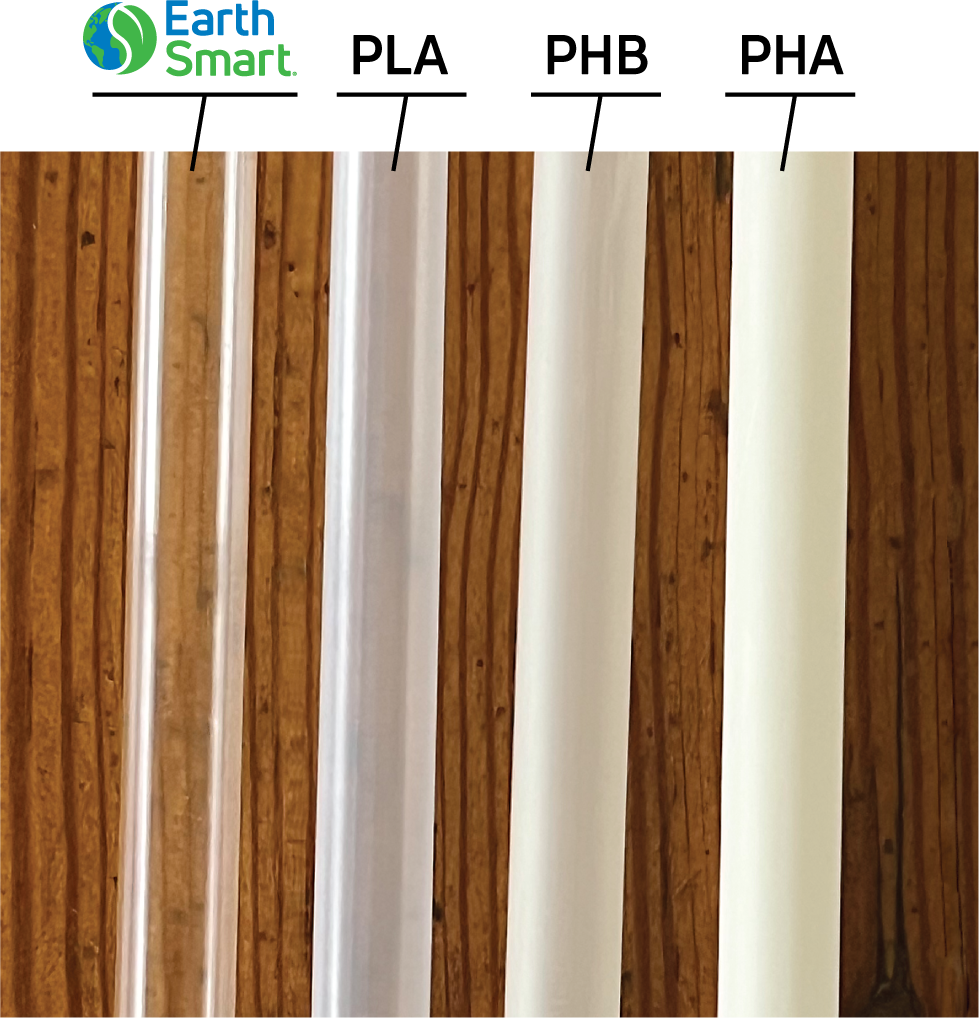In recent years, we have seen a growing demand for more sustainable alternatives to the traditional plastic straw. With demand always comes supply and the landscape has become crowded with various straw materials with differing environmental impacts – but to truly stand out, a solution must address the need for better materials while simultaneously providing a true recycling solution for the plastics that are already out there.
Amidst these solutions, Earth Smart® straws emerge as a beacon of sustainability, challenging the norms of the plastic straw market. Crafted from a harmonious blend of wood pulp and acetic acid1, Earth Smart® straws epitomize the commitment to a greener future. As we delve into the detailed comparison with other materials, it becomes evident that Earth Smart® is not just a brand but a catalyst for change, offering a solution that stands out in terms of composition, compostability, marine biodegradability, and the integration of recycled content. Join us in exploring how Earth Smart® straws lead the charge towards a more environmentally conscious straw culture.

Earth Smart® Straws
Material Composition: Earth Smart® straws are crafted from Cellulose Acetate1 – a blend of wood pulp and acetic acid, where the acetic acid is manufactured using recycled content that would have otherwise ended up in a landfill.
Compostability: Earth Smart® straws are not only industrial compostable but also suitable for home composting, ensuring a circular lifecycle.
Marine Biodegradability: At a material level2, Earth Smart® Cellulose Acetate1 is marine biodegradable, contributing to the reduction of ocean pollution.
Recycled Content: These straws are made from a material with certified recycled content, reinforcing their commitment to closing the loop on waste.
Advantages: Boasting the same clarity as traditional polypropylene (PP), Earth Smart® Cellulose Acetate1 straws decompose in managed landfills, addressing environmental concerns associated with plastic waste.
PLA:
Material Composition: Derived from corn starch and/or sugar cane, PLA straws are an alternative to traditional plastic.
Compostability: Limited to industrial composting facilities, PLA straws fall short in terms of home composting.
Marine Biodegradability: Unfortunately, PLA straws do not biodegrade in marine environments.
Recycled Content: Like many alternatives, PLA straws do not incorporate recycled content.
Disadvantages: PLA straws face challenges such as reliance on specific microbes for decomposition, lower temperature tolerance, and increased susceptibility to cracking.
PHA:
Material Composition: PHA straws are derived from the fermentation of virgin canola oil.
Compostability: Both industrial and home compostable, PHA straws align with Earth Smart® in end-of-life benefits.
Marine Biodegradability: Similar to Earth Smart®, PHA straws biodegrade in marine environments at a material level2.
Recycled Content: Unfortunately, PHA straws do not utilize recycled content in their production.
Disadvantages: Limited domestic supply and a milky appearance are factors that distinguish PHA straws from Earth Smart®.
Paper:
Material Composition: Traditional paper straws are made from wood pulp.
Compostability: Paper straws are industrial and home compostable.
Marine Biodegradability: Many paper straws contain a coating of polyethylene (PE) or acrylic resin to keep them from disintegrating during use. This coating keeps them from fully decomposing in a marine environment.
Recycled Content: The use of recycled content varies among different brands of paper straws.
Disadvantages: In addition to the obvious consumer experience disadvantages, some paper straws recently tested were found to contain more PFAS than traditional PP straws.

In the realm of sustainable straw alternatives, Earth Smart®’s material composition stands out as an eco-friendly option with a well-rounded set of benefits. Its composition, combined with certified recycled content and competitive pricing, makes it a leading choice for those seeking greener alternatives to traditional plastic straws. While other materials have their merits, Earth Smart®’s Cellulose Acetate1 emerges as a promising solution in the global movement towards a more sustainable and environmentally conscious future.
Choosing Earth Smart® straws is not just a choice; it’s a commitment to making a positive impact on our planet. Experience the clarity of a better choice by requesting a sample of Earth Smart® straws today. Click the button below and discover firsthand why The Difference is CLEAR. Join us in embracing a greener tomorrow, one straw at a time.
1 – The Acetic Acid is manufactured using recycled content that would have otherwise ended up in a landfill.
2 – Per ASTM D6691 test methodology
